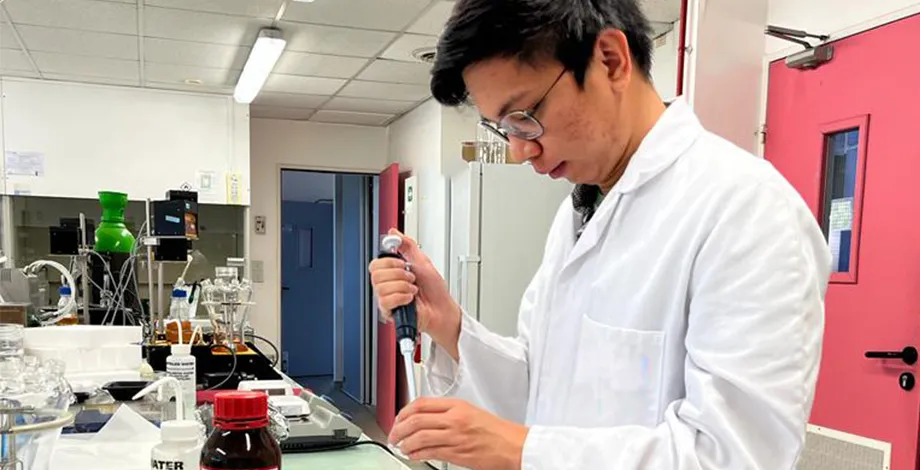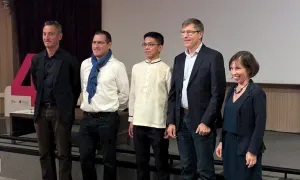International Research
Johnrell Zuniega’s insight on Institut Agro PhD - From Bananas to breakthroughs; a Filipino scientist's journey in France
04/08/2025
Update : 04/08/2025

Pursuing a PhD in France has been a transformative experience, both academically and personally. In 2024, I earned my PhD in Biochemistry and Physico-chemistry of Food Products and Nutrition at L’Institut Agro Montpellier, with my research conducted at UMR QualiSud (CIRAD), under the supervision of Dr. Pierre Brat and Dr. David Farrusseng, through the PhilFrance-DOST Fellowship Program.
Our research aimed to develop an innovative approach to combat crown rot in Cavendish bananas, a significant postharvest disease impacting fruit quality and export. The opportunity to conduct research in France provided access to cutting-edge research facilities, especially at CIRAD Montpellier. I worked with advanced chromatography for my study.
A one-month research stint at IRCELYON, CNRS (Villeurbanne, close to Lyon) allowed me to conduct desorption studies using state-of-the-art facilities. I also had the opportunity to visit a banana holding and distribution facility at Châteaurenard (Provence), which provided valuable insights into the global supply chain and postharvest logistics and quality control standards in a highly regulated market.
A junior researcher's journey across disciplines
Thanks to the great number of partnerships of Institut Agro Montpellier, collaboration with a multidisciplinary team, including experts in postharvest, phytopathology, material science and engineering, as well as physico- and biochemistry, further broadened my scientific perspective. Coming from an agricultural background, I initially lacked formal training in material science and engineering and physico-chemistry, but I embraced the challenge of learning new concepts and methodologies to bridge disciplines. This experience reinforced the value of interdisciplinary collaboration in addressing complex real-world problems.
Beyond research, my PhD journey was enriched by participation in academic and non-academic workshops and training programs. I also had the opportunity to present at international conferences in Lyon (France) and Rotorua (New Zealand), where I engaged with experts in postharvest. These opportunities not only broadened my scientific knowledge but also strengthened my ability to communicate scientific findings to diverse audiences.
From lab to lifestyle: embracing French culture
Living and studying in France was a unique and eye-opening experience. The French research environment emphasized critical and independent thinking, innovation, and collaboration across disciplines - which encouraged me to question and challenge existing paradigms, and propose new ideas. The work-life balance in France was also different – while researchers are productive, there is strong emphasis on well-being, a contrast to the often fast-paced academic culture in the Philippines. It turns out that life is still meant to be lived and not just merely existed in – an appreciation of quality life through embracing a balanced lifestyle, valuing meaningful connections, and recognizing the joy found in everyday moments.
Montpellier offers a Mediterranean climate with warm summer and mild winter, and close proximity to the coast, along with excellent wine and cheese, and easy access to neighboring European countries. Adapting to the French language and culture was initially challenging, but over time, I developed basic conversational skills necessary to engage with the local community. This cultural immersion, coupled with the support of an international network of friends and colleagues, strengthened my resilience and adaptability. I am grateful to the Filipino community in the South of France for bringing a piece of home to my heart.
Cultivating resilience: lessons from a PhD abroad in France
More than just earning a PhD, my time in France was a journey of self-discovery and growth. Being away from my family, I learned to embrace uncertainty, step out of my comfort zone, and appreciate different ways of thinking and cultural background. As I look back, I realize that my PhD journey is not just about the destination - it’s about the experiences, growth, and the people I met along the way. The challenges, the breakthroughs, the network, and the personal growth all contributed to shaping me into a better individual.
I am deeply grateful for the financial and moral support provided by the Department of Science and Technology – Science Education Institute (DOST-SEI) at Philippines, the French Embassy to the Philippines and Micronesia, and the Institute of Crop Science (ICropS) and Postharvest Horticulture Training and Research Center (PHTRC) of the University of the Philippines Los Baños (UPLB). Their unwavering support made this incredible journey possible.
Finally, I would like to share a quote from Mahatma Gandhi that inspired me throughout the journey:
Vivez comme si vous deviez mourir demain. Apprenez comme si vous deviez vivre éternellement. ("Live as if you were to die tomorrow. Learn as if you were to live forever.")
Beyond grateful ! Merci beaucoup !
Research into Innovative Solutions for Banana Crown Rot
Our research focused on developing an alternative method to control ‘Cavendish’ banana crown rot, a major postharvest disease that significantly affects fruit quality and export. We investigated the use of Zeolitic Imidazolate Framework-8 (ZIF-8), a metal-organic framework (MOF) nanoporous material, as carrier for thymol vapor. This innovative method significantly reduced internal crown rot while minimizing phytotoxic effects, particularly when bananas were packed in corrugated fiberboard cartons. These findings highlighted the potential utility of MOFs in controlled release systems for postharvest disease management.
Contacts
Related websites
L'Institut Agro Montpellier
2 place Pierre Viala
34060 Montpellier - France
Tél. : +33 (0)4 99 61 22 00 Tél. : +33 (0)4 99 61 22 00
Fax : +33 (0)4 99 61 29 00
contact@supagro.fr





















